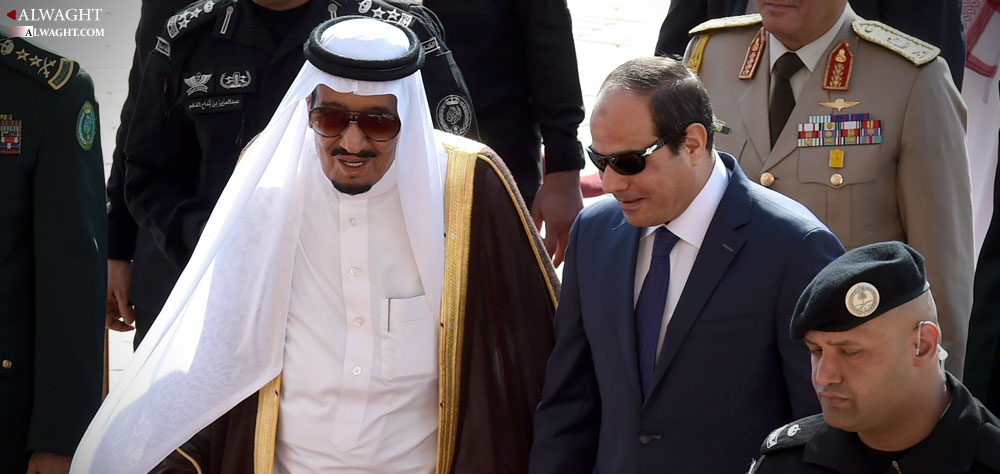Alwaght- Over last year, one of the issues creating great controversy in Egypt has been transfer of the Red Sea islands of Tiran and Sanafir to Saudi Arabia.
Respectively 80 and 33 square kilometers, the twin islands are uninhabited, with no energy resources.
But what makes them so strategically significant is their location. Located close to each other, the twin islands are lying at the mouth of the Aqaba Strait. Possessing them means domination over the sea traffic in the area.
The Aqaba Strait is significant for the Israeli sea transit as it provides access to the international waters. After 1954, Egypt blocked the strait and so grounded the Israeli vessels in the area. Egypt also barred the Israeli vessels from passing through the Suez Canal, pushing the Israeli sea transportation in dire straits for some time. Such Egyptian measures triggered the Six-Day Arab-Israeli war in 1967 that led to Israeli occupation of not only the Sinai Peninsula but also the two islands.
When the Camp David Accords were reached in September 1987, Tel Aviv agreed to return the two islands to Egypt and so recognize their possession by Cairo. International forces were later deployed to them to help situation stay under control there. Egypt, according to the deal, guaranteed uninterrupted link between Gulf of Aqaba and the international waters.
On the other side, Saudi Arabia has frequently claimed the islands' ownership, only to be faced by the Egyptian argument that they were given to Egypt according to a 1906 deal with the Ottoman Empire, years before establishment of Saudi state that was founded in 1932. Riyadh rejects the Egyptian account and presses that they are Saudi Arabian and only were rented by Egypt for a certain time for use against the Israeli regime.
The dispute was taken to the UN by the two countries, only to see the international court rule that the islands are Egyptian. However, since past year the issue of transfer has kept making headlines as two sides discussed possible agreement.
So far, the strong Egyptian people’s nationalism and the government’s decline to recognize the Saudi claims have prevented their transfer to Saudi Arabia. But now things have changed.
What is behind this transfer and how does it change the geostrategic map of the region in favor of Tel Aviv?
Egypt’s goals and interests
Egypt will receive $16 billion in aids from Saudi Arabia once it concludes the transfer deal with the Arab kingdom. Moreover, the Egyptian officials say that drawing the sea borders with Saudi Arabia will pave the way for energy exploration and investment in the surrounding area.
But the critics of the deal at home accuse the government of “selling” the two islands. Egypt has had friendly relations with the Israeli regime for a couple of decades and so it no longer needs the islands to put strains on Tel Aviv. This is the main drive for Cairo officials who seek cash in return for handing over the islands to Riyadh.
On the other side, this transfer will make Saudi Arabia a close neighbor of the Israeli regime. This, the analysts say, will help Egypt disburden itself of the responsibility to the Israeli-Palestinian conflict and instead Saudi Arabia will go under such duty. In case of handover, Riyadh will have to observe the terms of internationally recognized deal in relation to the islands, something in best interest of Tel Aviv.
Israeli goals and interests
The Israeli regime for years appeared an opponent of such a transfer deal as it feared losing Egypt as a neighbor in Aqaba Strait and getting a new one like Saudi Arabia, a state sponsor of terrorism and opponent of Tel Aviv. But things have changed in West Asia region during the past few years, particularly since the 2011 Arab uprisings that swept through the Arab world on the one hand, and Iran, a regional rival of Saudi Arabia, gained further power and influence on the other hand. This raised the hackles of Riyadh and made Tel Aviv seek alliance with the Arab states, particularly Saudi Arabia, to counter Tehran.
Israeli green light to the transfer means Tel Aviv's show of good faith to Riyadh and Cairo. At the same time, this form of territory transfer will become normal in the eyes of the Arabs and the Israelis can expect compromises of this kind when it comes to the Palestinian territories.
Additionally, once the islands are transferred to Saudi Arabia, they will move out of Saudi and Egypt control in terms of sea traffic rules. In fact, the two countries will have to consider international laws in their dealing with Tel Aviv over the sea traffic without involvement of their national sovereignty in the case. This mean having to act more responsibly towards the Israeli regime while it still occupies Arab territories.
Consequences of the deal
By doing so, Saudi Arabia and Egypt will give the Israeli regime a special privilege because they have to even intensify adherence to international principles in relation to Tel Aviv. This means reducing the geostrategic significance of their territories in favor of the Israeli regime.
The years-long Iranophobia campaign led by Tel Aviv made the Arab countries misunderstand who is their real enemy and consequently take anti-Tehran stances.
Last week, the Egyptian parliament put to vote the transfer case and finally upheld it. The approval drew bitter opposition across the country. Some critics called the move a “treason” by the government and a decline to save national territory. The issue even stirred violence in Egypt and pushed up national distrust in the government of President Abdel Fatah el-Sisi. The country now has ahead two ways: either people will remove the government through protests as they did before or the government will use iron fist policy to put down demonstrations. Tel Aviv will certainly benefit from such a situation while the Arabs will sustain damages.



























